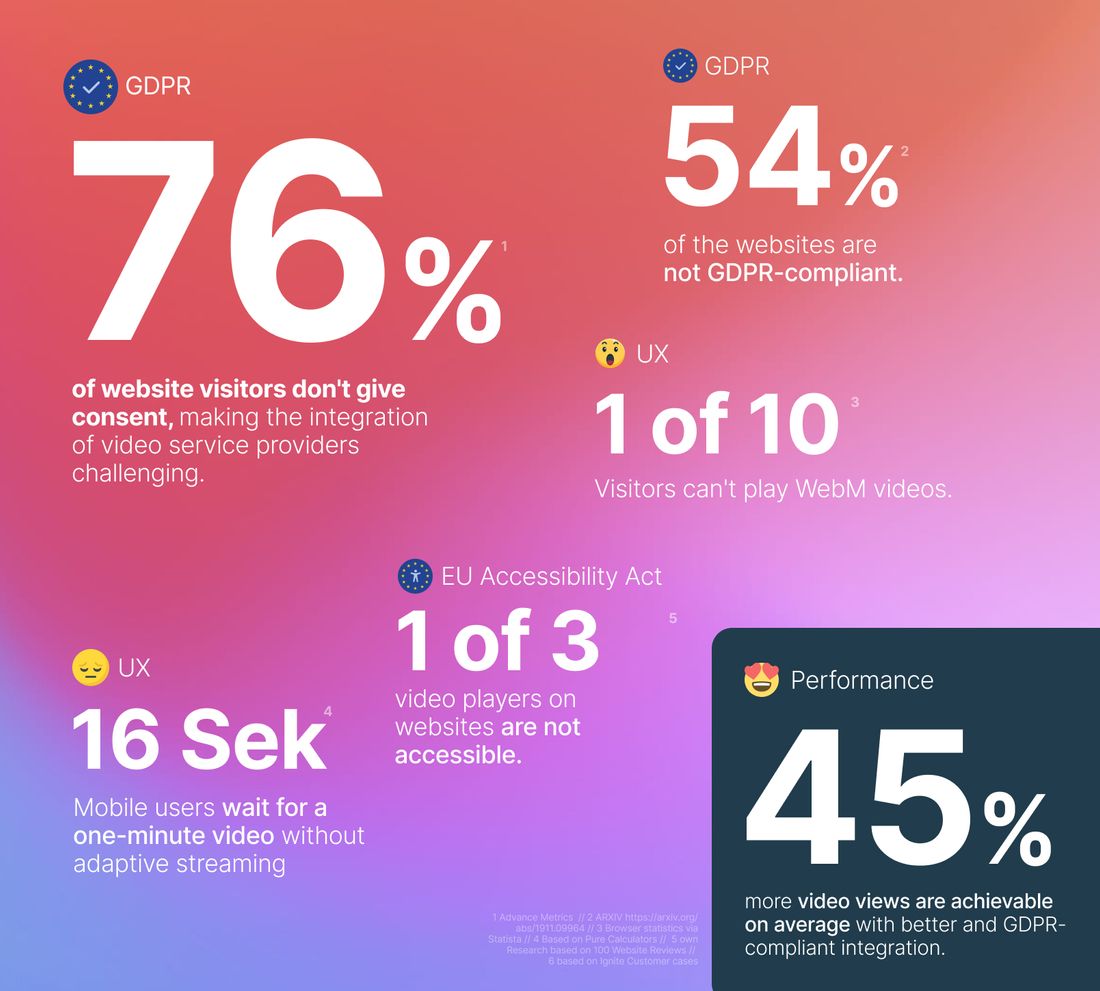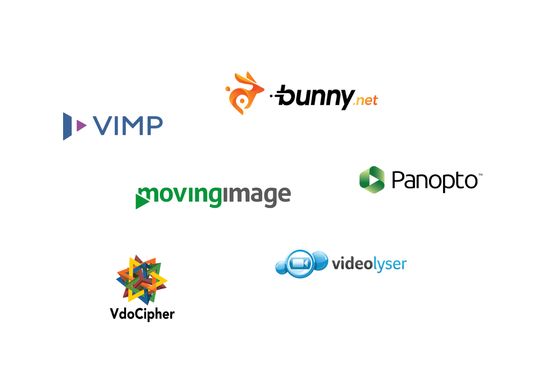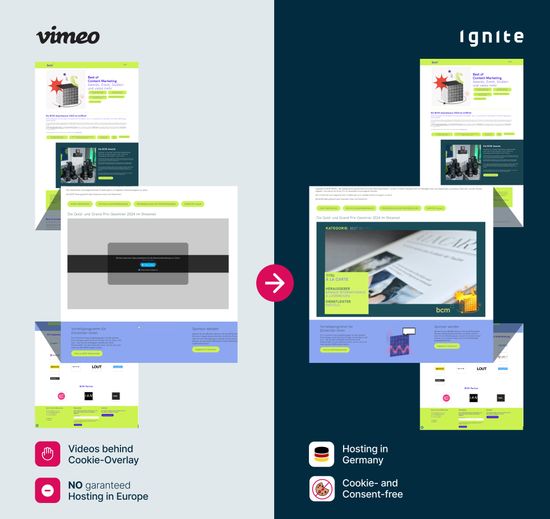OMR Reviews
find out more"I have finally found a tool that allows me to embed videos on my website in compliance with GDPR and without additional cookies."

In today’s digital world, video hosting is an essential part of any successful online strategy. Whether it’s product videos, tutorials, or corporate presentations, videos are the key to captivating and informing your audience.
Specifically in Europe, there are unique challenges you need to address to ensure optimal performance, user experience, data protection, and compliance with legal regulations.
In this article, you’ll learn why a dedicated video hosting service is crucial, what to consider when choosing video hosting in Europe, which providers are available, what GDPR compliance entails, and where the pitfalls lie.
The simplest way to host videos is by storing them alongside other files on your webspace and embedding them as MP4 files into your website.While this might work for smaller websites. While this might work for smaller websites, there are several reasons why dedicated video hosting solutions are a better choice:
If fast, secure, and professional video delivery is important to you, a dedicated video hosting service is indispensable.

Before deciding on a provider, you should first define your own needs. What are your key requirements? And which features do you only need occasionally? For example, live videos are a feature many companies rarely use but end up paying for throughout the year.
More importantly, your provider should deliver core functionalities, such as reliable and high-quality video hosting for your website. For specialized use cases like live streaming, you can rely on external experts.
Here are a few points to keep in mind when choosing a provider:
By considering these factors, you can ensure your video hosting solution meets both your current and future needs.
The market offers a wide range of video hosting providers. However, well-known platforms like YouTube or Vimeo do not guarantee hosting within Europe, let alone GDPR compliance. Below is a selection of providers that explicitly state they offer GDPR-compliant hosting:

A European privacy-first alternative designed to combine excellent user experience, performance, and data protection. Key features include:

A European provider offering a GDPR-compliant video platform hosted in EU data centers or available as an on-premises solution.
Based in Europe, Videolyser offers a user-friendly video hosting system suitable for small to medium-sized businesses.
Specializing in secure video hosting for enterprises, MovingImage provides GDPR-compliant solutions tailored to larger organizations.
Bunny.net is a European-based content delivery and video hosting provider that focuses on low latency and GDPR compliance.
Key Features:
Ideal for education and enterprise users, Panopto offers GDPR-compliant video hosting with strong support for video collaboration.
Panopto is based within the US but offers a dedicated hosting in Europe upon request. We assume that the service itself is not hosted in Europe, only the videos.
Key Features:
A European provider focusing on secure video hosting with DRM (Digital Rights Management) for content protection.
Panopto is based within India offers a dedicated hosting in Europe upon request. We assume that the service itself is not hosted in Europe, only the videos.
Key Features:
This list is not exhaustive, as there are numerous providers available. However, we have only included those that explicitly state they host data in Europe.
A provider based in Europe may sound promising, but this doesn’t automatically mean your data is stored within the EU. Many providers use international cloud services, whose exact hosting locations cannot always be guaranteed. Some rely on European cloud solutions, which can be GDPR-compliant but still come with limitations.
The clear advantage of platforms like Ignite: With Ignite, you can be sure that your data stays within Europe (Germany) and that the highest data protection standards are upheld.
The GDPR sets clear rules for the handling of personal data.
For video hosting, this means:
For most providers, being GDPR-compliant still requires obtaining explicit consent from visitors.
The problem: Depending on the website, 40–60% of visitors click “Reject” in the cookie banner. This makes autoplay videos in hero sections nearly impossible, and in-content videos require additional cookie overlays.

Warning: Many providers, including YouTube and Vimeo, offer so-called “cookie-free” options. While this may sound promising, it often isn’t enough:
In both cases, it’s better than nothing, but legal action (e.g., fines or warnings) is still possible, even if you think you’re doing everything right.
Make sure your provider is explicitly consent- and cookie-free—such as Ignite Video.
The devil is in the details—this is especially true for video hosting. Here are some common pitfalls to watch out for:
Video hosting in Europe requires a thoughtful approach. Define your needs, prioritize data protection, and choose a solution that aligns with your goals.
Ignite is a strong option if you want to host videos GDPR-compliantly without compromising on user experience.
Dedicated video hosting does more than just store files. It ensures better performance through faster loading, adaptive streaming, and reliable delivery – even during high traffic. If you care about privacy, speed, and seamless integration, a specialized hosting solution is the right choice.
Ignite is built for exactly that: privacy-first, cookie-free, and fully hosted in Europe.
GDPR-compliant hosting includes:
Ignite meets all these requirements: no cookies, no external scripts, and full infrastructure in certified European data centers.
Only if your video provider loads cookies or transmits personal data to third parties. Many platforms do this as soon as the page loads, which requires user consent.
Ignite is completely cookie-free. You can embed videos without a consent banner – as long as you’re not using other third-party tracking tools on your site.
Yes, but it often comes with technical and legal downsides. Most web servers aren't optimized for video streaming and lack features like adaptive bitrate streaming, analytics, and GDPR safeguards.
Ignite solves all of this: it's scalable, secure, and ready to use – with no complex setup and no infrastructure hassle.
That depends on the features you need. More important than price
Ignite offers transparent, monthly plans with full API access and a focus on privacy and user experience – no lock-in, no hidden tracking. From 9€ / month ...
Look for:
Ignite delivers on all of this – with over 35 positive reviews on platforms like OMR Reviews, Capterra, OMT, and G2. It’s trusted by organizations that prioritize compliance and performance.
There are a few specialized providers across Europe, but not many combine full GDPR compliance, performance, and ease of use.
Ignite is one of the few platforms that hosts entirely within the EU, avoids third-party tracking, and provides a privacy-first player – perfect for organizations that want to stay compliant without sacrificing UX.
The best GDPR-compliant solution avoids all third-party trackers, doesn’t require a cookie banner, and keeps your data entirely within the EU.
Ignite checks all the boxes: European infrastructure, no cookies, full player control, and seamless integration into your existing systems.